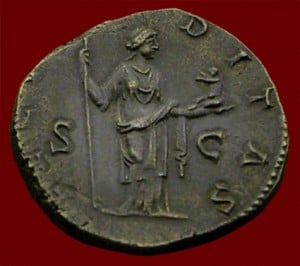Goldfinches and scarlet finches have taken on their summer colors. Hyacinths and Narcissus sway in the breeze beneath the magnolia trees just blooming. Only two weeks ago the ground was frozen and covered in snow. But with the warmth and sunshine comes early spring’s arrivals. Two women pull up in front of my house in an SUV. Well dressed, well groomed, they are obviously out of place in my neighborhood. They wish to tell me about some celebration they were holding next Friday, for Good Friday, they tell me.
They have their festival to celebrate the return of spring. I have mine. Today are the Ides of April. Flamen Dialis Corvus, assisted by his son, performed the monthly sacrifices for Jupiter Optimus Maximus today. In a few more days, on 19 April, flamen Cerealis Aurelianus shall offer sacrifices for Cerealia, the festival of the return of Proserpina from the dark realms of the Underworld and Her return to Her Mother Ceres, renewing the Earth once more with a rebirth of life. And then arrives Parilia on 21 April to celebrate the Founding of the Eternal City by Romulus. That same date we shall also celebrate the birth of Numa Pompilius, the second king of Rome after Romulus, who is recognized as having instituted the Religio Romana in its earliest form.

Next week shall be one of the holiest of weeks in the year. At Her sacellum, in past years, a turf altar has been erected before an image of Ceres Ferentina for Cerealia. Offered are fresh flowers and new herbs, and some dried herbs of last year, libations of milk sweetened by honey as well as libations of wine, libum cakes with mola salsa, and pieces of roasted meat. For Ceres this is properly an offering of pork, and thus for last year it was an offering of pig’s feet. The offerings roast throughout the day from just past sunrise until sunset. The ashes are then returned to the soil in Ceres’ garden, the hortus Cereris. The day is spent working in the garden, tending the altars, and reflecting on the cycle of life, springing from our Mother Earth, returning to Her embrace, then born again into new life. As Pythagoras instructed, “But never begin to set thy hand to any work, till thou hast first prayed the Gods to accomplish what thou art going to begin.” Thus the Cerealia holds special significance in the Garden of Ceres as we pray and sacrifice at the beginning of our horticulture year cycle and all the work it implies, as well as the change over to the beginning of the spring season.
When I was very young my grandfather would sacrifice a lamb each spring. His meat would be our meal, and other parts offered on the fire to Giove, while the lamb’s blood was poured as a libation for Him over the roots of grandfather’s grape vines. Then the spring wine was brought out, everyone pouring out libations to Giove in wine before enjoying the wine ourselves at a Vinalia celebration.
So this is a time of deep memories, holy traditions going back to the very Foundation of our religion, and here on my porch are two women who want to tell me about their celebration of spring. I hold my tongue. There is no need to voice my opinion of their myths and celebrations. It would only intrude on my preparations for my own celebrations. I have to think that they must somehow know, that they must realize how strangely barbaric their myths sound to others. And they must feel terribly insecure about their own tradition to go around door to door in that manner. But don’t they realize as well that they have implied my religion, my family traditions, are somehow unworthy in their eyes? Why would you bother about my traditions if you thought them somehow unworthy? And what must be so wrong with your tradition that you espouse if you need reaffirmation in it from others? So they come to my door, naively insulting my religion, unwittingly insulting their own religion, and in truth they have insulted all religions by behaving so presumptuously.















